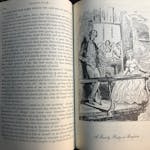Until his retirement in 1989, Edgar Feuchtwanger spent his professional adult life teaching and writing about German history. However, as a child in Munich he witnessed German history in the making, being caught up in, and nearly churned up by, the tumultuous events that convulsed the country and propelled it toward war. "Hitler, My Neighbor: Memories of a Jewish Childhood, 1929-1939" is a unique account of the rise of a regime, the moral decline of a nation, and one family's desperate battle for survival.
When the book opens in 1929, Feuchtwanger is 5. The only son of German-Jewish parents, he is a typical happy-go-lucky boy: he plays outdoors, loves Mickey Mouse and enjoys sunny family vacations. But slowly his days become overcast, for in that same year, Adolf Hitler moves into the building across the road.
At home young Edgar begins to hear words like "Jew," "war" and "Hitler." Rosie, his nanny, draws the curtains when she catches him spying on his neighbor, or forces him to walk faster when passing his house. One night Edgar dreams that "the man opposite turns into an ogre, he catches us and wants to eat us."
Feuchtwanger takes us through the years, each one bringing fresh waves of pressure and restrictions, clamp-downs and round-ups. Nazis infiltrate the Reichstag "like wolves in a sheepfold" and Hitler is appointed chancellor. "As our world gradually shrinks, his expands." Nationalism preponderates and anti-Semitism proliferates. The family tries to continue as normal, but following Kristallnacht their valuable belongings are "confiscated" and Edgar's father is sent to Dachau. On his release, he and his wife make the painful decision to send their son off to England.
Countless books have been written about this dark chapter. What makes this one special is its child's-eye view. We are there with a young boy as he hides under a table and eavesdrops on conversations between his father and uncle. We overhear assessments, predictions and descriptions of the escalating chaos and its chief instigators: "treacherous little runt" Goebbels, "irascible aviator" Goering and Hitler, "the most cowardly of maniacs." Edgar notices and records curious or pertinent details, whether the disfigurements of the war wounded, the Führer's piercing blue eyes and nose hair, or his father's shaking hands and shaving cuts.
Edgar is so innocent and trusting that it is all the more shattering when his world is rocked: Rosie disappears, no longer allowed to work for a Jewish family; his schoolmates join the Hitler Youth and turn their back on him; his uncle flees but his parents wait too long and wonder if there is anywhere left to run. Translator Adriana Hunter expertly conveys the narrator's sense of hope and fear.
We can be relieved that an "invisible little Jewish boy" got out before he became too visible. And we can be grateful that he grew up to write this remarkable memoir.
Malcolm Forbes has written for the Times Literary Supplement, the Economist and the Daily Beast. He lives in Edinburgh, Scotland.
Hitler, My Neighbor
By: Edgar Feuchtwanger, with Bertil Scali. Translated from the French by Adriana Hunter.
Publisher: The Other Press, 209 pages, $25.95.





